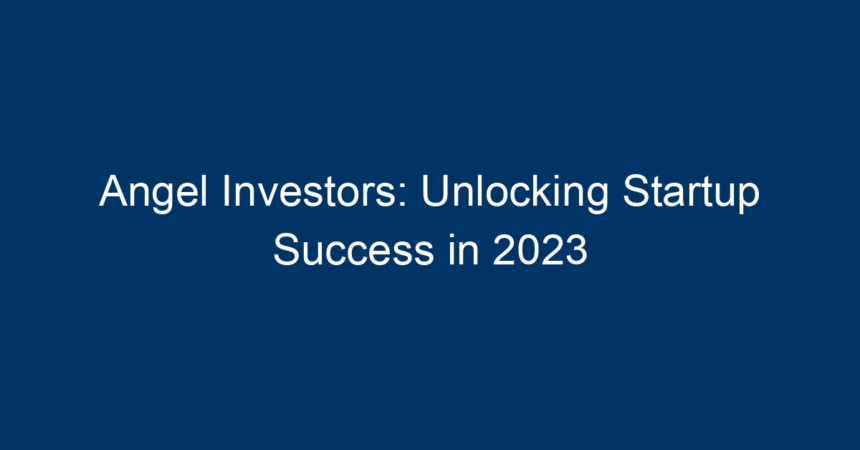In the dynamic landscape of modern entrepreneurship, securing funding is often the critical factor that can make or break a startup. Among the myriad of funding options available, angel investors have emerged as indispensable allies for budding entrepreneurs. These affluent individuals provide not just capital but invaluable mentorship and connections that can accelerate growth. In 2023, as the startup ecosystem evolves, understanding the role of angel investors is crucial for anyone looking to launch or scale a business.
What Are Angel Investors?
Angel investors are typically high-net-worth individuals who invest their personal funds into startups and early-stage companies. Unlike venture capitalists, who manage pooled funds from various investors, angel investors use their own wealth, allowing them more flexibility in their investment choices. This personal stake often motivates them to provide not just financial support but also strategic guidance, industry insights, and networking opportunities.
How Angel Investors Differ from Other Funding Sources
Angel Investors vs. Venture Capitalists
While both angel investors and venture capitalists play significant roles in funding startups, they differ in several key areas:
- Funding Stage: Angel investors often invest at earlier stages compared to venture capitalists, who usually come in during Series A or later rounds.
- Investment Size: Angels typically invest smaller amounts, from $5,000 to $500,000, whereas VCs might invest millions.
- Control and Influence: Angel investors often take a more hands-on approach in mentoring founders, while VCs may involve themselves less in day-to-day operations but focus on strategic oversight.
Angel Investors vs. Crowdfunding
Crowdfunding platforms like Kickstarter and Indiegogo have gained popularity as alternative funding sources. However, unlike angel investors, crowdfunding involves multiple backers who contribute smaller amounts in exchange for rewards or equity. While crowdfunding allows for reaching a broader audience, angel investors offer personalized support and potentially larger sums of money.
The Importance of Angel Investors in 2023
Bridging the Funding Gap
In today’s economic climate, many traditional funding avenues have become more stringent and competitive. Angel investors offer a vital lifeline for startups navigating these challenges. They not only provide crucial early-stage capital but also help founders refine their business models and go-to-market strategies.
Expanding Access to Expertise
Angel investors often have industry-specific experience, which can prove invaluable. Whether it’s through direct mentorship or making strategic introductions, their involvement can help entrepreneurs avoid common pitfalls. In a world where speed to market is crucial, having access to this kind of expertise can be a game-changer.
Building Credibility
Securing funding from an established angel investor can significantly enhance a startup’s credibility. This not only attracts further investment from other sources but also helps in building partnerships and customer trust. In 2023, when consumer skepticism is high, having a reputable angel investor backing your startup can give you a competitive edge.
How to Attract Angel Investors
Getting an angel investor on board is no small feat. Here are actionable strategies to enhance your chances of securing support:
Develop a Solid Business Plan
A well-structured business plan is your first step in attracting angel investors. It should clearly outline your value proposition, market analysis, competitive landscape, and financial projections. This document acts as the roadmap for your startup and demonstrates to potential investors that you have a clear vision and strategy.
Create a Compelling Pitch Deck
Your pitch deck should encapsulate your business plan in a visually engaging and succinct format. Highlight key metrics such as user growth, sales figures, and market potential. Remember, your goal is to tell a compelling story that resonates with the values and interests of potential angel investors.
Network Strategically
The importance of networking cannot be overstated. Attend startup events, conferences, and workshops where angel investors are likely to congregate. Utilize platforms like LinkedIn to connect with potential investors. Building relationships before seeking funding can lay the groundwork for a successful pitch later.
Leverage Online Platforms
In 2023, several online platforms connect startups with angel investors. Websites like AngelList and SeedInvest offer entrepreneurs the opportunity to showcase their business to a wider audience and attract funding. Having a strong online presence can increase your visibility and allure.
Key Factors Angel Investors Look For
When evaluating startups, angel investors generally consider several crucial factors:
Market Opportunity
Investors will assess the size and growth potential of your target market. A startup that is operating within a rapidly expanding industry is far more appealing. Clearly outline your market research and growth projections in your pitch.
Team Experience
A talented, committed, and experienced founding team can often be more significant than the business idea itself. Highlight the complementary skills and backgrounds of your team members to showcase why you are uniquely positioned for success.
Traction
Demonstrating traction, whether in the form of user adoption, revenue, or partnerships, is critical for attracting angel investors. Use metrics to illustrate your growth and potential impact.
Exit Strategy
Investors want to know how they’ll make money from their investment. Clearly outline your plans for exiting, whether through acquisition or public offering, to reassure investors that there’s a viable path for returns.
Common Challenges Faced by Startups in Securing Angel Investment
Share Dilution
One of the primary concerns for entrepreneurs is the potential dilution of ownership. Accepting funds from angel investors means you will likely have to give up a chunk of equity. It’s essential to find a balance that allows you to secure funding while retaining enough stake in your business.
Misalignment of Vision
Sometimes, conflicts can arise due to differing visions between founders and angel investors. It’s crucial to ensure that your goals and values align with those of your investors to foster a productive partnership.
Market Fluctuations
In an unstable economic environment, attracting angel investors can become even more challenging. Entrepreneurs should remain adaptable and prepared to pivot their business model if necessary.
Conclusion
In the competitive startup realm of 2023, angel investors stand out as invaluable partners who can unlock the doors to success. Offering much more than just funding, they bring industry expertise, mentorship, and connections that are crucial for growth.
By understanding what makes angel investors tick and how to effectively engage them, you can position your startup for a successful funding journey.
Actionable Insights:
- Craft a compelling business plan and pitch deck to attract angel investors.
- Network actively within startup ecosystems to build meaningful relationships.
- Understand your audience—know what angel investors are looking for and tailor your approach.
- Be prepared for due diligence—investors will want to delve deep into your business model and projections, so be transparent and well-prepared.
By following these strategies, you can effectively leverage angel investors to turn your startup dreams into reality.




